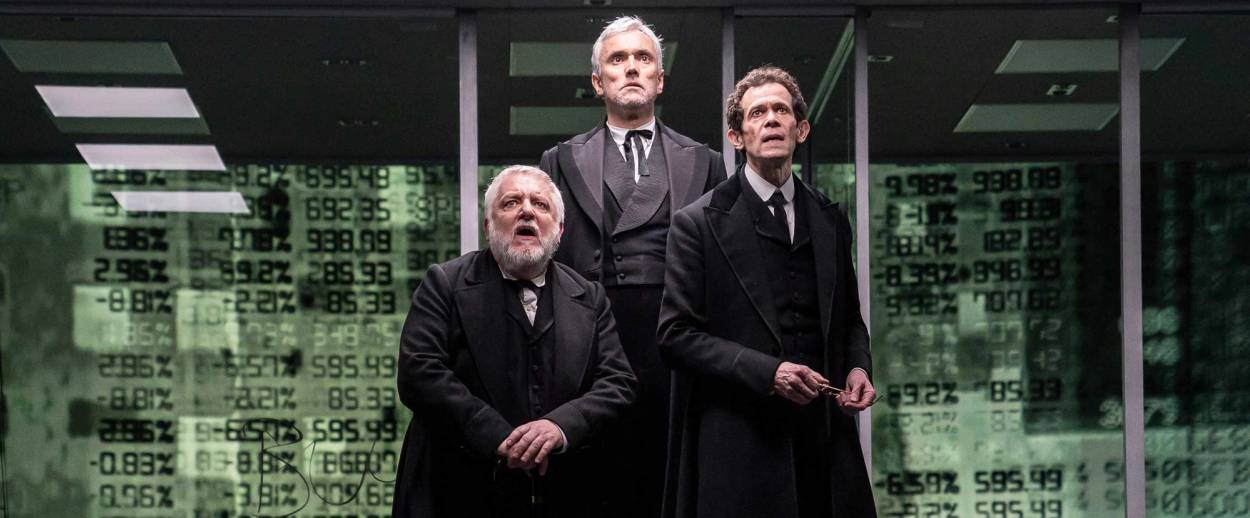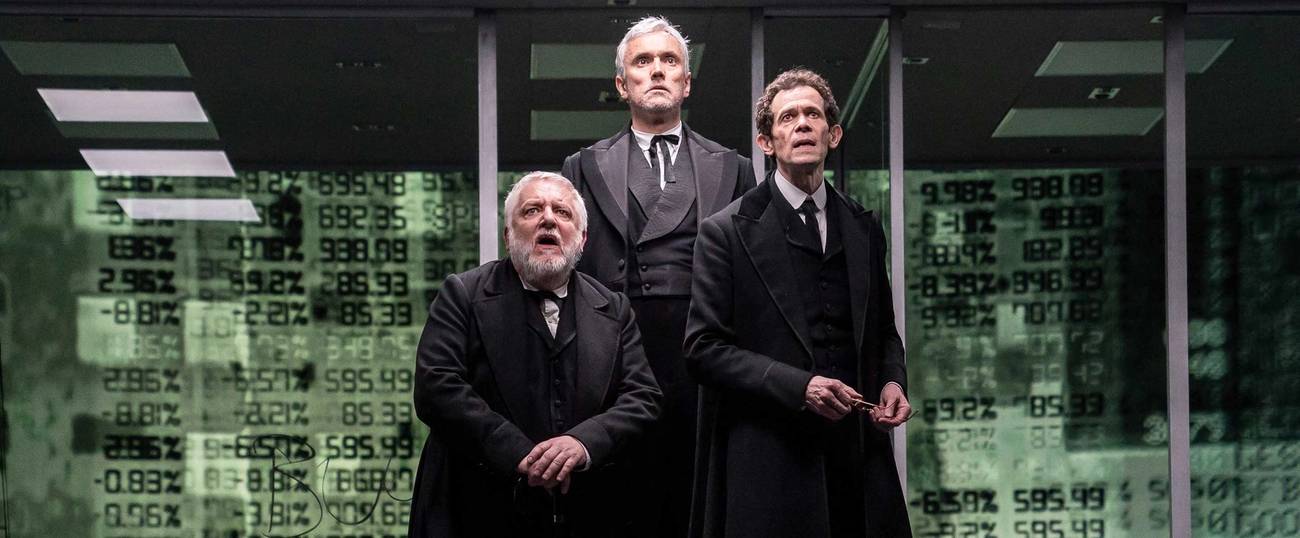Greedy Jews!
New York’s current hot ticket, ‘The Lehman Trilogy,’ is an epic parable of capitalism. But can a Jewish immigrant family embody the American dream?




The Lehman Trilogy is the hottest play in town—required viewing for the financial and theatrically minded cognoscenti, the new Hamilton for wealthy New York hipsters. A ticket that originally sold at $95 at the Park Avenue Armory now goes for $1,200 on StubHub, if you can nab one.
The original five-hour-long play about the rise and fall of an American Jewish family that lent its name to the famous trading house was written by the Italian playwright Stefano Massini (who speaks Hebrew) and originally staged in 2015 in Milan. The New York version has been translated and slimmed down by two of Britain’s most gifted dramatists and transported from the London stage to the Armory, one of New York’s most innovative theatrical venues. Seeing the play in the city in which the family’s story and their firm’s financial tragedy unfolded adds additional pathos and intellectual punch. The gushing reviews—“a transfixing epic of riches and ruin,” wrote Ben Brantley of The New York Times—coupled with its limited run, from March 22 to April 20, have intensified the rush for tickets and its status as must-see theater. So what’s not to like?
Plenty, alas.
Yes, the actors are sublime. It doesn’t get much better on the stage than Simon Russell Beale, Adam Godley, and Ben Miles. For 3 hours and 20 minutes, the veteran British actors, clad in black on a stark, largely black-and-white set, brilliantly bring to life literally dozens of main and supporting characters—from wailing infants to blushing brides, haughty wives and the ambitious men they marry. With charm, wit, and impressive stamina, they chronicle the rise and fall of the storied immigrant Jewish family from rural Bavaria. Es Devlin’s set is fabulous: The rotating, glass box filled largely with packing boxes is an original. The glass cubicle on which the Lehmans write is backed by Luke Halls’ stunning black-and-white videos of Alabama and New York through time. Sam Mendes’ direction is superb.
The play turns the rise and demise of Lehman Brothers into a parable of the failings of contemporary capitalism. Lehman’s growth over three generations and its even more spectacular 2008 demise become what Ben Power, its gifted adapter, calls “an epic theatrical poem,” an almost “Homeric” narrative of the “150 years of Western Capitalism told through a single family.” It’s “the Godfather with middlemen, not mobsters,” quipped Variety in one of the few more skeptical reviews.
But a parable of capitalism told through a single New York family doesn’t sustain itself as high drama for this length of presentation. Despite the acting, a creative set, elegant staging, and inspired direction, The Lehman Trilogy often feels more like a lecture than a play.
Another challenge is the focus on a Jewish immigrant family as the embodiment of the American dream. The play chronicles the reshaping, and the eventual abandonment, of the family’s Judaism and ritual observance over time. As each generation of Lehmans become colder, greedier, and more cynical, their attachment to traditional Jewish ritual and values fades. The family mourns Henry’s passing by closing the firm and sitting shiva for a week; a generation later, Lehman Brothers pauses for just a few seconds when closing the firm. Rebecca Kobrin, who teaches Jewish history, argues in one of several essays in the Armory’s oversized but elegant playbill that by the time Lehman Brothers collapsed, “its identity as a Jewish firm had become secondary to its international dealings.” But playwright Massini seems conflicted at times about whether the family’s loss of faith helped trigger its financial demise, or whether its integration in American life triggered that inevitable loss of faith.
Although Massini is Jewish, his play also contains subtle but pervasive intimations of the classic anti-Semitic tropes it ostensibly laments, with invocations of Jewishness—and Jewish power, and Jewish money—used to cover gaps in the author’s dramatic imagination and historical reach.
The tale of the Lehmans is certainly not lacking in strong characters and historically significant incident. Part of the Lehman family arrives in New York but quickly migrates to Alabama, where the brothers begin selling cloth by the inch and basic home goods to poor Southerners; before long they are lending money to plantation owners in exchange for payments in cotton, which they sell—at a profit, imagine—to New York manufacturers. The family’s core commodity then slowly becomes money itself.
If there is a debate, or even discomfort within the family about the morality of propping up slave owners, or profiting from civil war, there is little indication of it, while the actors utter more “Baruch Hashems” than New York has skyscrapers. The audience is never permitted to forget that the enterprise and ambition that built modern capitalism—and three generations and 160 years later, the rapacious, self-destructive greed it inspired—are not just part of the American experience, but part of a particularly American Jewish impulse or imperative. At the play’s end, the three original Lehmans reappear in their first Alabama store to say kaddish as the financial chaos sparked by their bankrupt firm in New York spreads throughout the world. Since the family is less than devout by then, the dramatic resort to kaddish feels like a particularly gratuitous reach for a significance at once overgeneralized and at the same time a bit creepy.
The first act is the play’s strongest. Opening on Sept. 15, 2008, when the firm formally files for bankruptcy, the play slips seamlessly back to 1844, when Hayum Leyman, a young German Jew, arrives in New York, the “magical music box called America,” then home to only 15,000 Jews. He is wearing his best pair of shoes, ready not only to adapt to this new land of opportunity but to step literally and figuratively onto uncharted terrain. When a customs official cannot pronounce his name, Hayum becomes Henry, changing his name as did so many immigrants before and after him. Followed a few years later by brothers Emanuel and Mayer, the three brothers help transform American commodity trading, accepting payment not just in cotton, but in cotton yet to be grown. They soon become the largest players in what becomes known as “futures contracts.”
The Lehman firm is a great survivor. When much of Montgomery, Alabama, burns, the Lehmans’ small store escapes the flames. When the Civil War devastates much of the South, the Lehmans move north, investing in the steel and railroads needed for reconstruction. When the stock market collapses in the 1929 crash, the next generation of Lehmans is once again lucky, or smart. Robert “Bobbie” Lehman, having recently launched an investment trust, has not yet plowed the millions he has raised from the trust’s shareholders back into the market. In the 1930s and the Great Depression, he bets on what he considers businesses of the future—airplanes and Hollywood. In 1933, writes Peter Chapman, the author of a book about Lehman and another contributor to the Armory’s voluminous playbill, “King Kong scaled the Empire State Building with Lehman money. … In the 1950s, Lehman Brothers prospered from its investments in what became essentially ‘American objects and industries,’ from Ford cars, oil wells, and the rise of television to computing and weaponry.” He also created a trading department, a move destined to become a devastating part of the firm’s legacy.
When Bobbie dies in 1969, he leaves no heirs. For the first time, the firm is not led by a Lehman. The lack of Lehman leadership, Massini seems to suggest, helps trigger the firm’s collapse. But the moral decay at the heart of what is presented as a family tragedy starts earlier and runs deeper. Over three generations, the family grows distant, first from the cotton and other raw materials it trades in and then from the industries for which it serves as brokers. “We use money to make more money,” declares Philip Lehman, the first Lehman born in New York. When Emanuel and Mayer propose investing in housing for American workers, Philip dismisses their proposal, investing instead in the Panama Canal to secure a large portion of world commerce.
By the late 1990s, Lehman’s trading department, like so many other banks and traders, was busy bundling and trading mortgages that were offered with minimal regulation to people who could often ill afford them. When the mortgage bond market collapsed in September 2008, Washington decided that “an example had to be made,” writes Chapman. With no federal help forthcoming, Lehman—then the smallest of the main investment banks and without “friends in high places”—collapses. When it fails, stock markets throughout the world follow. The worst financial crash in history, which threatened not only markets but governments themselves, finally prompts massive (and much-criticized) government bailouts and economic stimulus programs—without which, Chapman implies, capitalism itself would have collapsed.
Strangely, although the play’s narrative begins to sag in the second act, Massini makes little of what must have been a searing intrafamily debate during the Depression over the responsibility of corporations and how large a role government should play in regulating big business. After all, Herbert Lehman, then governor of New York, worked closely with President Franklin D. Roosevelt to slap strict controls on bank speculation. But the play devotes little attention to what could have been a dramatically powerful character and theme—one that suggests that civic responsibility, rather than a narrow ethnic particularism that curdled into corrosive greed, was also part of the Lehman Brothers’ legacy.
***
Like this article? Sign up for our Daily Digest to get Tablet magazine’s new content in your inbox each morning.
Judith Miller, Tablet Magazine’s theater critic, is a former New York Times Cairo bureau chief and investigative reporter. She is also the author of the memoir The Story: A Reporter’s Journey.